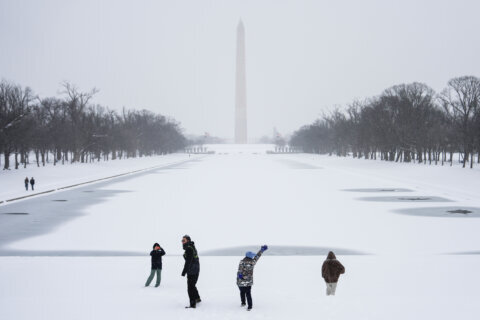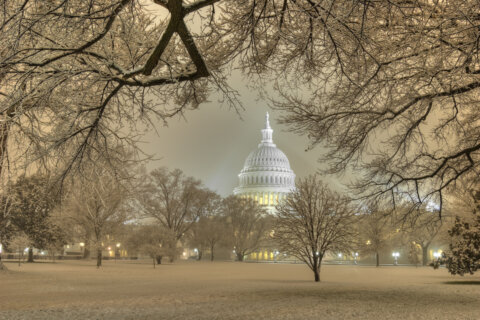Listen live to WTOP for traffic and weather updates on the 8s.
Tropical Depression Debby has the potential to be a “drought buster” for the D.C. region, but that will depend on the intensity, duration and location of the rainfall expected.
That’s according to Michael Nardolilli, executive director of the Interstate Commission on the Potomac River Basin.
Nardolilli told WTOP the region’s been stressed this summer: “Before this recent rain, 57% of the Potomac Basin was experiencing extreme drought conditions, while 19% were experiencing severe drought conditions.”
Ahead of Friday, recent rains had put a slight dent in drought conditions. The ICPRB started conducting daily drought monitoring “when the flow of the Potomac River at Point of Rocks dropped below 2,000 cubic feet per second.”
Nardolilli said that in the past two days, the ICPRB was pleased to see “that number now is 5,000 cubic feet per second and it is expected to rise,” so the ICPRB has suspended daily drought monitoring.
On July 29, the Drought Coordination Committee at the Metropolitan Washington Council of Governments declared a drought watch, urging the nearly 6 million residents in the metropolitan Washington region to voluntarily conserve water.
“That was a real big step for the Council of Governments because that was the first drought watch that they’ve issued since 2010,” Nardolilli said.
Lisa Ragain, principal water resources planner with the Metropolitan Washington Council of Governments, said while Tropical Depression Debby might help alleviate drought conditions when it comes to the region’s water supply, don’t expect an immediate lifting of the drought watch from MWCOG.
That’s because seeing a “recharging” of the region’s groundwater supply — when rainwater seeps into the aquifer — won’t happen overnight, she said. In communities such as Loudon and Fauquier counties, they rely more on groundwater and that groundwater recharge takes a while, according to Ragain.
Ragain said once Debby rolls out of the area, MWCOG’s committee on drought coordination will regroup and look at conditions.
The drought watch recommendations, which urge regular conservation of water, are something she’s lived with since she was a child. She grew up on the West Coast and said, “I have all my drought habits … turning off your water when you brush your teeth, don’t let the water run when you wash your dishes, shorter showers, that whole thing.”
Nardolilli added that even if Debby proves to be a drought buster as far as the water supply is concerned, farmers could still be struggling with the effects of the drought.
“The severity of the rain, getting it all at once is not what you want,” he said. “You want a slow, steady rain over a long period of time for it to seep into the soil.”
In situations where there are intense storms, after drought conditions, “The fact that it runs off doesn’t help the farmers at all,” said Nardolilli.
He said historically, some of the worst droughts in the Potomac River Basin occurred in 1930 and again in 1966.
In the 1966 drought, Nardolilli said it was “broken” after severe rain storms rolled into the region in September of that year.
While that was good in terms of the water supply, Nardolilli said there was also large scale runoff: “There were cars floating down Four Mile Run in Arlington, for example.”
So, he said of much-needed rain, “You get it all at once, and it really doesn’t help if it all runs off without seeping into the ground.”
Get breaking news and daily headlines delivered to your email inbox by signing up here.
© 2024 WTOP. All Rights Reserved. This website is not intended for users located within the European Economic Area.








